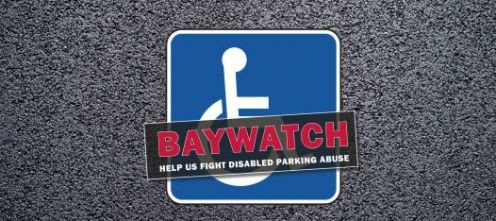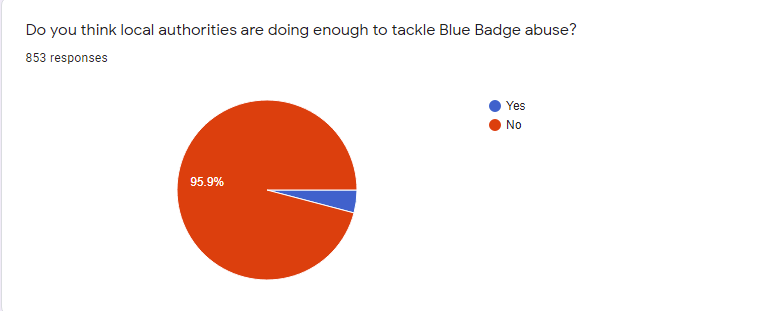From ‘Disabled Motoring UK’

We received a record 853 responses to our Baywatch survey this year and we would like to thank all those who completed the survey and supported the campaign. The results have now been calculated. One of the most alarming statistics was that 79.5% of the respondents stated that they either find it ‘difficult or ‘very difficult’ to find suitable disabled parking.
In August we asked the public to help us with our annual Baywatch campaign. We asked disabled motorists to complete a survey about their parking experiences over the past 12 months. The results have now been calculated.
DMUK would like to thank everybody who participated in our Baywatch 2021 campaign. Once again, we received a record number of responses this year with 853 completed surveys submitted. This level of response shows that disabled parking abuse continues to be a primary concern of disabled motorists. We would also like to thank all of our supporting organisations for promoting the campaign and encouraging their supporters to take part.
FINDINGS
Local Authorities
This year’s survey again confirmed that the majority of disabled motorists, 95.9% of respondents, think that local authorities are not doing enough to tackle disabled parking abuse.
The survey also revealed that 85.3% of the respondents had never had their Blue Badge inspected by an official. This means that out of a total of 853 respondents only 125 people have ever had their Blue Badge inspected. Unsurprisingly, 95.2% of those who responded would like to see Blue Badges being inspected by officials more often.
It is clear from these findings that local authorities still need to do more to enforce the Blue Badge scheme to ensure that disabled parking bays are available for genuine Blue Badge holders. With changes to Blue Badge eligibility criteria in recent years there are now more Blue Badge holders than ever before, so appropriate disabled bay enforcement and provision has become even more vital.
Supermarkets
When it comes to finding suitable disabled parking bays at supermarkets, 41.9% of those surveyed said that it was ‘easy’ and 10% said it was ‘very easy’. However, 56.5% of respondents also stated that they ‘very often’ see disabled parking bays being abused. This would suggest that there is still more work to be done in the correct management and enforcement of those bays. This figure has risen 5% from our Baywatch survey last year so it suggests that disabled bay abuse at supermarkets is getting worse.

Supermarkets are not doing enough to enforce their disabled parking bays and support their disabled customers. The disabled bays still aren’t being managed properly and enforcement is definitely lacking.
When looking specifically at enforcement of disabled parking bays, we asked people when parking at a supermarket do they ever see signs of enforcement. Only 35.5% of respondents said that they either saw signage or someone monitoring the bays. Last year’s figure was 55.1% so it is very concerning that the situation seems to have deteriorated. We then asked people if they had reported disabled parking abuse to a member of staff, did the staff member take action. Of our participants 90% said no. This shows a clear disregard for the problems disabled motorists face when trying to find parking.
General Findings
Similarly, to last year, the survey also asked people to provide details of the parking experiences on everyday journeys (not just to the supermarket). In response to these types of questions 79.5% of the respondents stated that it was either difficult or very difficult to find suitable disabled parking.
In this section of the survey, we also asked the respondents how often they saw disabled bays being abused on their everyday journeys. In response to this question a concerning 88.7% of respondents said that they either saw this occurring ‘often’ or ‘very often’. This figure is alarming and shows that the wider parking industry is not doing enough to enforce disabled parking provisions.

We added a new question to the survey this year and asked people how often they noticed disabled bays varying in size and specification. In answering this question just less than half of the respondents (46.8%) said that this was the case. This therefore suggests that both local authorities and private parking operators need to ensure they are following the British Standards when installing disabled parking bays in all their car parks. Many car parks are clearly falling short when it comes to appropriate bay design. It is crucial that the size and specification of these bays meets accessibility standards so that disabled motorists can get in and out of their vehicles safely.
DMUK finds the overall findings of our Baywatch Campaign very distressing. Being able to park at one’s desired destination and enter and get in and out of the vehicle safely is something that is crucial to the independence of disabled people. Unfortunately the survey shows that disabled motorists are still being disadvantaged. The poor state of the nation’s disabled parking provision and enforcement continues to prevent disabled people from living independent lives. It is vital that the parking industry now understands the importance of providing adequate disabled parking and making sure it is properly enforced
DMUK CEO, Graham Footer said: “We are thrilled with the level of support that this year’s Baywatch campaign has received. However, the results show that the parking industry and local authorities still aren’t doing nearly enough to support disabled people. Accessibility begins in the car parks and disabled bay enforcement is a crucial part of allowing disabled people to live independent lives. DMUK urges everyone in the parking sector to take this issue seriously”


